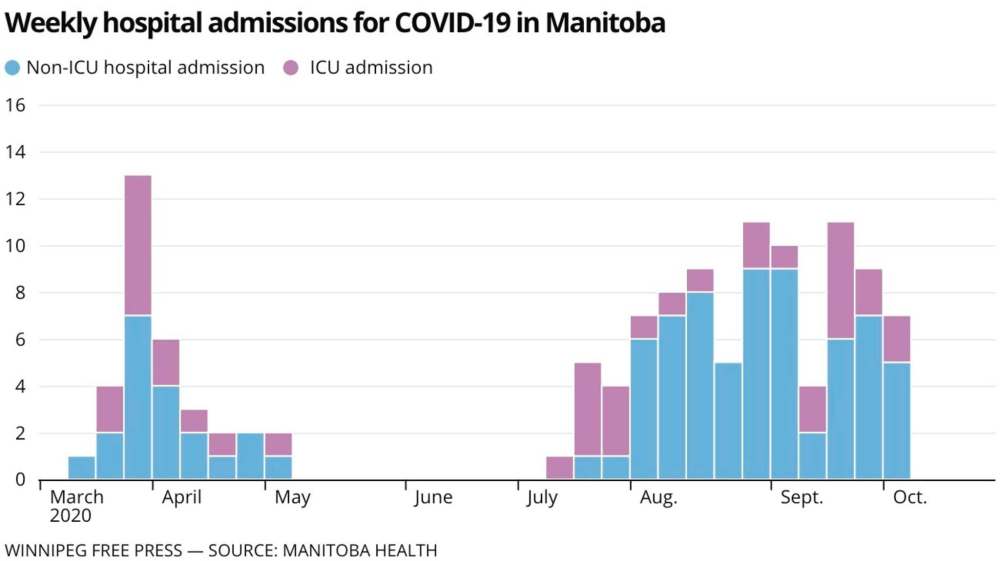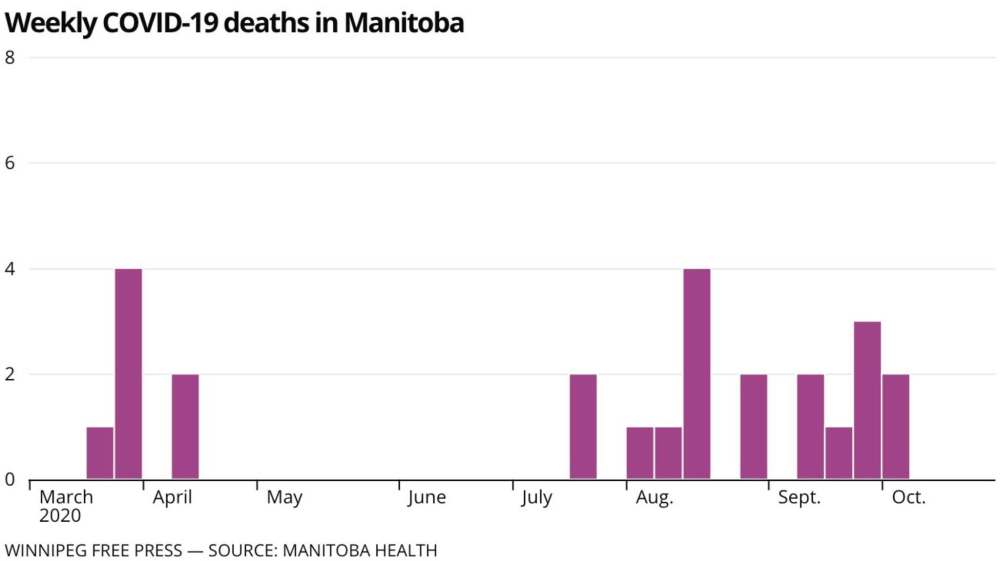Front-line anxiety builds as COVID-19 numbers rise
Read this article for free:
or
Already have an account? Log in here »
To continue reading, please subscribe:
Monthly Digital Subscription
$0 for the first 4 weeks*
- Enjoy unlimited reading on winnipegfreepress.com
- Read the E-Edition, our digital replica newspaper
- Access News Break, our award-winning app
- Play interactive puzzles
*No charge for 4 weeks then price increases to the regular rate of $19.00 plus GST every four weeks. Offer available to new and qualified returning subscribers only. Cancel any time.
Monthly Digital Subscription
$4.75/week*
- Enjoy unlimited reading on winnipegfreepress.com
- Read the E-Edition, our digital replica newspaper
- Access News Break, our award-winning app
- Play interactive puzzles
*Billed as $19 plus GST every four weeks. Cancel any time.
To continue reading, please subscribe:
Add Free Press access to your Brandon Sun subscription for only an additional
$1 for the first 4 weeks*
*Your next subscription payment will increase by $1.00 and you will be charged $16.99 plus GST for four weeks. After four weeks, your payment will increase to $23.99 plus GST every four weeks.
Read unlimited articles for free today:
or
Already have an account? Log in here »
Hey there, time traveller!
This article was published 06/10/2020 (1890 days ago), so information in it may no longer be current.
Anxiety is growing on the front lines of Manitoba’s health-care system as COVID-19 cases and the pandemic death toll continue to rise, unions say.
“It’s raised the anxiety level of those who work in acute, non-acute, and home care settings,” said Debbie Boissonneault, president of Canadian Union of Public Employees Local 204. The union represents 14,000 workers at more than 50 care facilities in Manitoba.
Members are worried about getting infected at work — and that they may be taking the novel coronavirus home to their families, Boissonneault said Tuesday, as hospitalizations in the province soared.
Public health officials announced 56 new COVID-19 cases — the highest daily count since Sept. 26 (65). The majority of Tuesday’s cases were reported in Winnipeg (31) and Interlake-Eastern Health region (22).
On the same day, the number of people hospitalized with COVID-19 doubled to 28, from 14 on Sept. 29. Half of those hospitalized in the province are in Winnipeg.
“What we’re seeing now with hospitalizations rising again is that level of risk for those caring for people in hospitals is rising again,” said Bob Moroz, president of the Manitoba Association of Health Care Professionals, which represents 6,600 allied health-care workers, from paramedics to respiratory therapists.
“These are the workers who’ve been there on the front line right from the beginning of the pandemic, and we’re still there,” he said. “A lot of these folks will have used up income protection (benefits) and sick time and are really worried.”
“These are the workers who’ve been there on the front line right from the beginning of the pandemic, and we’re still there. A lot of these folks will have used up income protection (benefits) and sick time and are really worried.”
– Bob Moroz, president of the Manitoba Association of Health Care Professionals
Winnipeg — in its second week of pandemic restrictions, mandating masks in public and limiting gathering sizes to 10 — has the vast majority of active COVID-19 cases in the province. On Tuesday, there were 781 cases in the province; 671 in the capital city.
The number of new cases wasn’t expected to decline until at least one incubation period (14 days) had passed. So far, it’s not looking good, health-care industry members said.
“We were already in an acute nursing shortage,” Manitoba Nurses Union president Darlene Jackson said Tuesday. “Now there’s more and more concern among nurses that they can’t keep up.”
Some areas of the health-care system are short 20 to 24 per cent of the nurses they require, Jackson said. “When I talk to nurses, they’re anxious and concerned: ‘What is the government going to do about this?'”
The impact of provincial health-care cuts and transformation prior to COVID-19 are hitting hard now, she said. “We were not well-prepared to weather the pandemic.”
Even as Manitobans did their part early in the pandemic to flatten the curve so health-care leadership would have time to prepare and put plans in place, “We’ve had very little progress or feedback,” Moroz added Tuesday.
Elsewhere, the rising number of COVID-19 cases has left many front-line workers “overwhelmed, scared, terrified,” said the president of the Manitoba Government and General Employees’ Union.
“We’re second in the country,” in terms of the number of cases per capita, Michelle Gawronsky said in response to Manitoba’s latest COVID-19 bulletin. “I beg this government to please fund everything in health care that is needed to flatten the curve… I beg them to put the people before the dollar.”
“We were already in an acute nursing shortage. Now there’s more and more concern among nurses that they can’t keep up.”
– Manitoba Nurses Union president Darlene Jackson
She also commended front-line workers for their commitment: “They keep going into work no matter the fear. They’re doing it because they’re dedicated and because they care.”
The labour leaders said they hope the public understands the seriousness of the virus, and its potential to wreak havoc on the health-care system. “They want people to wear their masks,” Boissonneault said of CUPE Local 204 members.
Health-care workers are also counting on “code orange” restrictions in the Winnipeg area to take the COVID-19 threat level down a notch.
“It would be the hope that we start to see the numbers drop sooner rather than later,” said Moroz. “I don’t think anyone wants to up the level from orange to red, like our friends in Quebec.”
Jackson said the provincial government needs to step up, but so do the Manitoba residents.
“We’re all in this together,” she said.
carol.sanders@freepress.mb.ca
COVID-19 update
The province reported Tuesday that 1,904 lab tests had been completed Monday.
Manitoba’s five-day COVID-19 test positivity rate was 2.4 per cent. Of the 56 new cases reported Tuesday, 31 were in Winnipeg, 22 in Interlake–Eastern, two in Southern Health, and one case in Prairie Mountain.
Public health officials reported additional possible virus exposures at two Winnipeg schools: Andrew Mynarski V.C. and Dufferin School; both on Sept. 28-29. There is no evidence of in-school transmission or that a case was acquired in the schools, officials said.
Public health reminded residents, starting Wednesday, the requirement for non-medical face masks in all Manitoba health facilities will extend to doctors’ offices and community service providers affiliated with the health regions.

Our newsroom depends on a growing audience of readers to power our journalism. If you are not a paid reader, please consider becoming a subscriber.
Our newsroom depends on its audience of readers to power our journalism. Thank you for your support.








